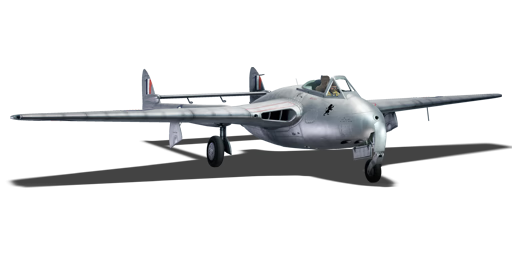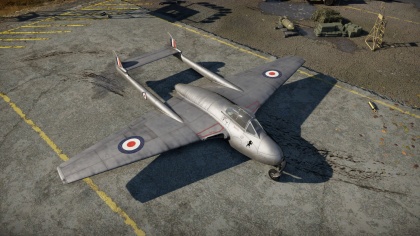Vampire F.B.5
Contents
Description
The Vampire F.B.5 is a rank V British jet fighter
with a battle rating of 7.7 (AB/SB) and 8.0 (RB). It was introduced in Update 1.33.
When using the Vampire, the first thing a pilot should know is that it is inferior in most aspects to its opposition, thus requiring constant vigilance and consciousness of weakness. The Vampire cannot reach the speeds a MiG-9 or an F2H-2 can, it cannot accelerate as well as many of its counterparts and it is appalling in a dive against most of its opponents. So, essentially, the "Vamp" cannot climb well, it can't catch many jets in a straight line and it can't out-accelerate much of its opposition. However, the Vampire has one impressive advantage against its jet-powered opponents: it can turn incredibly well. In fact, a good analogy to flying the Vampire is fighting jets in propeller aircraft.
In order to be able to use the de Havilland Vampire's turning power, one should worry about one's energy state. To do such, climbing is important, as is maintaining airspeed. One should never risk being below 400 km/h, since having little speed makes it incredibly hard to evade any attacks by faster aircraft. As such, climbing at speeds above 400 km/h IAS is a healthy option - altitude provides manoeuvring space and more options for manoeuvres, whilst keeping a certain speed means that the pilot is ready at all times to manoeuvre against an enemy. Once an enemy is spotted, gaining speed is the best choice, since the lack of it means the Vampire will become every pilot's nightmare - low, slow and un-manoeuvrable. Its extreme manoeuvrability for a jet means, however, that lining up for a shot is an easy task when an enemy is flying near, and, when an inexperienced or frustrated enemy jet falls into the trap of turning tightly against the Vampire, it will likely end up destroyed. Aiming the guns might be a challenge at first for inexperienced Vampire pilots, since their placement below the centre of gravity makes the Vampire's nose shift downward while firing. Pilots should be aware that turning too much can leave them vulnerable to other enemy aircraft due to the significant loss of speed, so they should never commit to a dogfight if more enemies are lurking nearby.
General info
Flight Performance
Describe how the aircraft behaves in the air. Speed, manoeuvrability, acceleration and allowable loads - these are the most important characteristics of the vehicle.
| Characteristics | |||||||
|---|---|---|---|---|---|---|---|
| Stock | |||||||
| Max Speed (km/h at 4,572 m) |
Max altitude (meters) |
Turn time (seconds) |
Rate of climb (meters/second) |
Take-off run (meters) | |||
| AB | RB | AB | RB | AB | RB | ||
| 817 | 792 | 10668 | 25.0 | 25.7 | 16.1 | 15.1 | 650 |
| Upgraded | |||||||
| Max Speed (km/h at 4,572 m) |
Max altitude (meters) |
Turn time (seconds) |
Rate of climb (meters/second) |
Take-off run (meters) | |||
| AB | RB | AB | RB | AB | RB | ||
| 895 | 855 | 10668 | 23.5 | 24.0 | 24.4 | 20.0 | 650 |
Details
| Features | ||||
|---|---|---|---|---|
| Combat flaps | Take-off flaps | Landing flaps | Air brakes | Arrestor gear |
| ✓ | ✓ | ✓ | ✓ | X |
| Limits | ||||
|---|---|---|---|---|
| Wing-break speed (km/h) |
Gear limit (km/h) |
Combat flaps (km/h) |
Max Static G | |
| + | - | |||
| 520 | ~10 | ~5 | ||
| Optimal velocities | |||
|---|---|---|---|
| Ailerons (km/h) |
Rudder (km/h) |
Elevators (km/h) |
Radiator (km/h) |
| < 550 | < 600 | < 600 | N/A |
| Compressor (RB/SB) | ||
|---|---|---|
| Setting 1 | ||
| Optimal altitude | 100% Engine power | WEP Engine power |
| 3,000 m | 1,224 hp | N/A |
Survivability and armour
- 38 mm Bulletproof glass - Armored windscreen
- 12.7 mm Steel - Armor plate behind the pilot's head
- 3 mm Steel - Armor plate under the engine
Armaments
Offensive armament
The Vampire F.B.5 is armed with:
- 4 x 20 mm Hispano Mk.V cannons, chin-mounted (150 rpg = 600 total)
Suspended armament
The Vampire F.B.5 can be outfitted with the following ordnance:
- Without load
- 2 x 1,000 lb G.P. 1,000 lb Mk.I bombs (2,000 lb total)
- 8 x 76 mm RP-3 rockets
Usage in battles
Describe the tactics of playing in an aircraft, the features of using vehicles in a team and advice on tactics. Refrain from creating a "guide" - do not impose a single point of view, but instead, give the reader food for thought. Examine the most dangerous enemies and give recommendations on fighting them. If necessary, note the specifics of the game in different modes (AB, RB, SB).
Manual Engine Control
| MEC elements | ||||||
|---|---|---|---|---|---|---|
| Mixer | Pitch | Radiator | Supercharger | Turbocharger | ||
| Oil | Water | Type | ||||
| Not controllable | Not controllable Not auto controlled |
Not controllable Not auto controlled |
Not controllable Not auto controlled |
Combined | Not controllable 1 gear |
Not controllable |
Modules
| Tier | Flight performance | Survivability | Weaponry | ||
|---|---|---|---|---|---|
| I | Fuselage repair | Offensive 20 mm | |||
| II | Compressor | Airframe | GLBC mk.3 | ||
| III | Wings repair | Engine | New 20 mm cannons | ||
| IV | G-suit | Cover | GRC mk.8 | ||
Pros and cons
Pros:
- Good armament, 4 x chin-mounted 20 mm Hispano Mk.V's
- Great control responsiveness up to medium-high speeds, combat flaps to increase this
- Great manoeuvrability
- Capable air-brakes that increase lift when activated
- Decent payload options
- Lack of single vertical tail section makes spotting planes from the cockpit much easier
Cons:
- Low top speed and acceleration (acceleration can be improved with research)
- Weapons are placed below the centre of mass, forcing the pilot to aim higher
- Vulnerable tail section, especially easy to hit when taking off it not careful
- Poor dive rate
- Reflective silver camouflage comes default, making spotting you much easier from above
History
Describe the history of the creation and combat usage of the aircraft in more detail than in the introduction. If the historical reference turns out to be too big, take it to a separate article, taking a link to the article about the vehicle and adding a block "/ History" (example: https://wiki.warthunder.com/(Vehicle-name)/History) and add a link to it here using the main template. Be sure to reference text and sources by using <ref></ref>, as well as adding them at the end of the article with <references />. This section may also include the vehicle's dev blog entry (if applicable) and the in-game encyclopedia description (under === Encyclopedia Info ===, also if applicable).
Media
Excellent additions to the article would be video guides, screenshots from the game, and photos.
See also
Links to the articles on the War Thunder Wiki that you think will be useful for the reader, for example:
- reference to the series of the aircraft;
- links to approximate analogues of other nations and research trees.
External links
Paste links to sources and external resources, such as:
- topic on the official game forum;
- encyclopedia page on the aircraft;
- other literature.
| Britain jet aircraft | |
|---|---|
| Blackburn | Buccaneer S.1 · Buccaneer S.2 · Buccaneer S.2B |
| British Aerospace | Harrier GR.7 · Sea Harrier FRS.1 (e) · Sea Harrier FRS.1 · Sea Harrier FA 2 |
| British Aircraft Corporation | Strikemaster Mk.88 |
| English Electric | Canberra B Mk 2 · Canberra B (I) Mk 6 · Lightning F.6 · Lightning F.53 |
| Gloster | Meteor F Mk 3 · Sea Meteor F Mk 3 · Meteor F Mk 4 G.41F · Meteor F Mk 4 G.41G · Meteor F Mk 8 G.41K · Meteor F Mk.8 Reaper |
| Javelin F.(A.W.) Mk.9 | |
| de Havilland | Vampire F.B.5 · Venom FB.4 · Sea Venom FAW 20 · Sea Vixen F.A.W. Mk.2 |
| Hawker | Sea Hawk FGA.6 · Hunter F.1 · Hunter F.6 · Hunter FGA.9 · Harrier GR.1 · Harrier GR.3 |
| Panavia | Tornado GR.1 · Tornado F.3 · Tornado F.3 Late |
| SEPECAT | Jaguar GR.1 · Jaguar GR.1A · Jaguar IS |
| Supermarine | Attacker FB 1 · Attacker FB.2 · Scimitar F Mk.1 · Swift F.1 · Swift F.7 |
| Foreign | Phantom FG.1 (USA) · Phantom FGR.2 (USA) · F-4J(UK) Phantom II (USA) |
| Australia | F-111C |
| India | ▄MiG-21 Bison |
| South Africa | ▄JAS39C |





